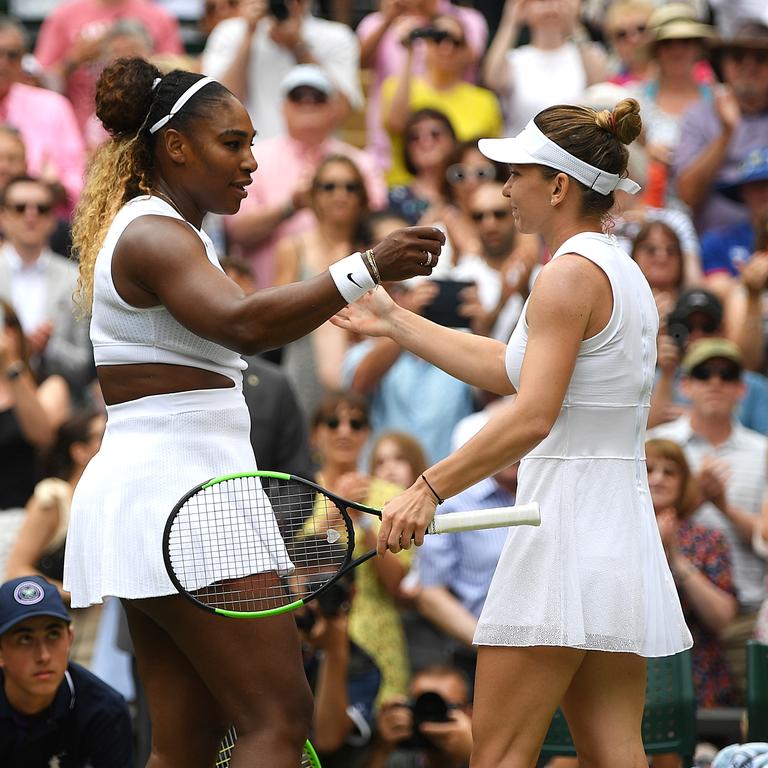
This article is more than
2 year oldSerena Williams has reacted in savage fashion to Simona Halep’s sensational doping ban, tweeting “8 is a better number” after her rival’s career was left in tatters.
Former world number one Halep was given a four-year suspension from tennis for two doping offences, the International Tennis Integrity Agency said Tuesday.
The 31-year-old Romanian has been provisionally suspended since October last year after testing positive for the blood-boosting substance Roxadustat at the 2022 US Open.
And in May the two-time Grand Slam singles champion was charged with a second anti-doping breach relating to irregularities in her Athlete Biological Passport (ABP).
Both charges have been upheld by an independent tribunal.
Halep, who has been provisionally suspended since October 2022, will not be able to play professional tennis again until October 6 2026.
What did Serena Williams say?
Williams, who Halep annihilated 6-2 6-2 in the 2019 Wimbledon final, one of the American’s unsuccessful attempts to match Margaret Court’s grand slam record, reacted quickly to the news on Twitter by claiming that tournament as her eighth title at the All England Club.
She also liked a tweet by former tennis player Nicole Gibbs which read: “Such a disappointment when you discover like half of your heroes from your sports days were cheating. Just so so frustrating and makes sports so dumb – not a fair fight and makes you wonder how many are skating by unnoticed (I think probably a lot).”
Soon after the ITIA statement was released, Halep announced she would appeal the decision, saying: “Today (Tuesday), a tribunal under the tennis anti-doping program announced a tentative decision in my case. The last year has been the hardest match of my life, and unfortunately my fight continues.
“I have devoted my life to the beautiful game of tennis. I take the rules that govern our sport very seriously and take pride in the fact I have never knowingly or intentionally used any prohibited substance. I refused to accept their decision of a four-year ban. I intend to appeal to The Court of Arbitration for Sport.”

Mouratoglou, Cahill react to the ban
Patrick Mouratoglou, who coached Williams from 2012 to 2022 before becoming Halep’s coach, also released a statement saying “I cannot believe the decision”.
“I am extremely shocked and I have been during htis whole year by the methods and the behaviour of an organisation that is supposed to treat the players fairly and try to establish the truth,” it read.
“I know Simona’s intergrity and I have no doubt that she has never taken any banned substance.
“I sat through the entire two days of hearing with her and CANNOT believe that the tribunal has reached that decision based on the evidence and arguments that I heard.”
Australia’s Darren Cahill, who coached Halep to the number one ranking, also defended her.
“My support in Simona is unwavering,” he tweeted. “Stay strong, Simo. This was always heading to the Court of Arbitration for Sport in Switzerland.”
An independent tribunal, which heard evidence from Halep, the winner of the 2018 French Open and 2019 Wimbledon singles titles, met in London on June 28-29.
On September 11, the tribunal — which also heard evidence from scientific experts and sifted through some 8000 pages of evidence — confirmed it had found Halep had committed intentional violations under tennis’s anti-doping program.
One of these was the use of Roxadustat discovered in her urine sample at the 2022 US Open, with the other breach based on collection and analysis of 51 blood samples provided by Halep as part of the ABP program.

What is Roxadustat and the Athlete Biological Passport?
Roxadustat is a substance that can be used legitimately to treat anaemia. But it is also on the World Anti-Doping Agency banned list as it is considered a blood-doping agent, which increases haemoglobin and the production of red blood cells.
The biological passport system is designed for the long-term monitoring of an athlete’s blood indicators with the aim of identifying irregularities that could indicate doping.
Halep has claimed experts found she had accidentally taken a contaminated supplement.
But the ITIA said Tuesday that while the tribunal accepted Halep had taken a contaminated supplement, they also “determined the volume the player ingested could not have resulted in the concentration of Roxadustat found in the positive sample”.
ITIA chief executive Karen Moorhouse said: “After a complex and rigorous hearing process, we welcome the independent tribunal’s decision.”
She added: “The ITIA has followed the proper processes as we would with any other individual — in accordance with the world anti-doping code — fulfilling our purpose and responsibility to uphold the principle of fair competition, on behalf of the sport.
“The panel recognised that appropriate procedure had been followed within the written decision.” Moorhouse said that, given “the significant public interest”, the full decision in Halep’s case “will be published in due course”.
– with AFP